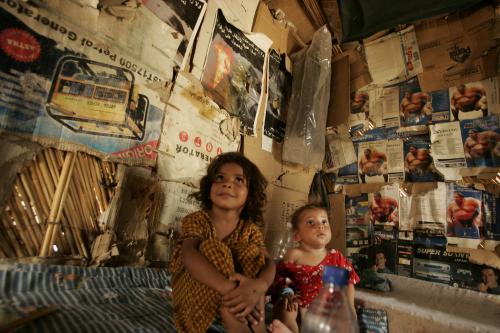Abdul-Khaliq Zankana, head of parliament’s committee on displacement and migration, said 200 billion Iraqi dinars (US$169.5 million) is to be allocated in the currently proposed 2010 budget for the Displacement and Migration Ministry.
“Although it is more than what was allocated in 2009, it still won’t alleviate all the suffering of IDPs and returnees and [significantly] improve their living conditions,” Zankana told IRIN.
“We consider the displacement crisis a long-term one - its file can’t be closed in one or two years, as some say. And we believe that increasing the amount [of money for them] will help alleviate a big portion of this segment’s suffering.”
He said he had first proposed that 500 billion Iraqi dinars ($424 million) be allocated for IDPs and returnees but when this was rejected his committee amended the bid to 400 billion Iraqi dinars ($339 million). This latter bid was officially still under consideration.
In 2008, Zankana’s committee appealed for a separate budgetary allocation to meet the needs of IDPs and returnees either by allocating 3-5 percent of Iraq’s oil revenues or setting aside $2 billion, but both suggestions were rejected by the government, which said it had to tackle other issues first, such as municipal services and security.
His calls are supported by prominent Iraqi activist Basil Abdul-Wahab al-Azawi, head of the Baghdad-based Commission of Society Enterprises, an umbrella group of more than 1,000 NGOs inside and outside Iraq. Al-Azawi has suggested that a joint committee with representatives from the Displacement Ministry and local and international NGOs should be set up to evaluate the needs of IDPs.
He also called on the government to shoulder all the costs relating to IDPs and returnees (without reliance on outside agencies), and have international NGOs focus on assisting refugees in neighbouring countries.
IDP payments not made
Zankana said lack of funds and bureaucracy had undermined aid to IDPs and returnees last year.
An allocation of 100,000 Iraqi dinars ($80) was supposed to be paid monthly to each displaced family but in reality most IDP families received the payment only once.
Furthermore, of the 45,000 families who returned to their areas of origin in 2009 and were thus entitled to receive one million Iraqi dinars ($850), only about 36,000 received the payment, Zankana said.
“There is still not enough interest in this segment. Each year we try and make appeals but get no response from the government,” he said.
According to recent government figures, there are nearly 2.6 million IDPs in Iraq and about two million Iraqi refugees in neighbouring countries, mainly Syria and Jordan.
sm/ed/cb
This article was produced by IRIN News while it was part of the United Nations Office for the Coordination of Humanitarian Affairs. Please send queries on copyright or liability to the UN. For more information: https://shop.un.org/rights-permissions




